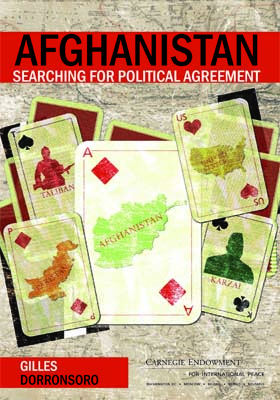Coalition strategy in Afghanistan has reached an impasse: tactical successes will not defeat the Taliban while Pakistan offers sanctuary, nor can security be “Afghanized” by a government that lacks legitimacy and is irreparably unpopular. A less costly—both in lives and money—and more effective option would be a negotiated agreement with the Taliban that paves the way for a unity government.
Challenging the coalition’s strategy:
- Small military setbacks will not deal a significant blow to the Taliban as they have more than 30,000 insurgents and a steady pool of potential recruits. Co-opting local figures is unlikely—this failed in 2002 when the Taliban were at their weakest.
- The coalition’s “go local” strategy of supporting unchecked local militias is polarizing the Afghan public and further weakening Afghan institutions.
- The idea that 80 percent of insurgents can be enticed to lay down their arms for jobs has no empirical basis. The Taliban remain a cohesive, nationally organized movement.
- Parliamentary elections slated for September will only further undermine the legitimacy of the Afghan government—fraud is inevitable.
To begin negotiating with the Taliban, the coalition should:
- Involve Pakistan: Pakistan must be included—as the intermediary to the Taliban—even at the expense of India’s involvement. Pakistan is the only country in the region that is a potential spoiler in the process.
- Establish a cease-fire: A cease-fire during the negotiation process would demobilize the Taliban and distance them from radical groups like al-Qaeda and the Pakistani Taliban.
- Work around Karzai: The coalition should negotiate directly with the Taliban. The president is too weak and cannot make a commitment on key points, including the withdrawal of Western troops and security guarantees relating to al-Qaeda.
- Mobilize NGOs: A new constitution will need to be written to create a unity government and it will inevitably be more conservative than it is today. To prevent backsliding on human rights, particularly for women, the coalition must encourage NGO involvement in the process.
“Nothing guarantees that negotiations—if agreed to by the Taliban—will succeed. Furthermore, the regime that will be established will be unstable for months, perhaps even years,” writes Dorronsoro.
“But if the negotiations succeed, they will enable the formation of a national unity government in Kabul, a new constitution negotiated during a Loya Jirga, and internal and international guarantees to prevent the return of al-Qaeda. Given the current impasse in which the coalition finds itself, such a result is the best that one can hope for.”





